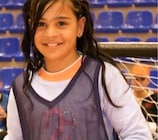Bucharest final thrill for children
Friday, May 25, 2012
Article summary
The UEFA Europa League final provided an unforgettable experience for ten children thanks to a joint initiative by UEFA, the Romanian Football Federation and Terre des hommes.
Article top media content

Article body
Ten deprived children experienced the thrill of a lifetime when they attended the recent UEFA Europa League final in Bucharest – thanks to UEFA, the Romanian Football Federation (FRF) and the Terre des hommes (Tdh) foundation.
The children have been included in the MOVE project supported by UEFA and run by Tdh, its social responsibility partner. Two of them were Afghan asylum-seekers, freshly arrived in Romania after a journey across five international borders.
A "child on the move" until recently, 15-year-old Samana felt like the luckiest person in the world at the 9 May final between Club Atlético de Madrid and Athletic Club – her first football match. Her departure from Afghanistan and eventful odyssey across central Asia was still very fresh in her memory. She arrived in Romania two months ago, after a long journey with her family through Central Asia, Russia, Ukraine and Moldova.
Samana enjoyed "the atmosphere, the music, dancing, all the people there – in one word, the 'fiesta'!". Her brother, nine-year-old Navid, was equally thrilled by the occasion. "I loved everything!" he said. "I cannot say anything more."
Samana and Navid were among other special guests in the 52,347 crowd: six children from disadvantaged families from the Dolj region and two boys from disadvantaged neighbourhoods in Bucharest. All ten children had won their tickets to the match in a draw organised by Tdh and the FRF.
The children involved have all suffered difficulties in their young lives, such as neglect or serious deprivation, abuse, exploitation, physical health, emotional problems or behavioural difficulties.
Forty children were initially selected by their peers to attend an event in Bucharest in March, on the basis of the following criteria: regular participation in MOVE activities, fair play and friendly attitude, non-discriminative behaviour, team spirit, leadership.
Another of the youngsters involved, Marian, was wearing a T-shirt marked 'Spain' and declared himself a Barcelona follower. "I was allowed to miss school classes [to attend]," he said excitedly, "and now I have such an opportunity to see great football players live."
At a ceremony before the match, Joseph Aguettant, country representative for Tdh in Romania, told the children: "Tell the people you know that you weren't just lucky, but you were also active in our project, you respected your mates, you didn't discriminate against anybody, you did not make any racist remarks. At Tdh, we are not a charity foundation: we support you and other Romanian children because you are the future leaders of this country."
The MOVE project started in 2008 and operates in Romania, Moldova and Albania. It is concerned with children's psychosocial development and social inclusion through games and sport, based on the MGS (Movement, Games and Sport) intervention model, and is implemented in collaboration with UEFA and local partners.
By bringing together children of different ethnic origins and getting them playing sport, MOVE seeks to develop their personal and social abilities. Besides members of the Tdh foundation, coaches and animators, the project also engages local authorities and schools. There are currently 28 communities from the Dolj region and ten schools from Bucharest taking part with a total of 400 trained animators.




